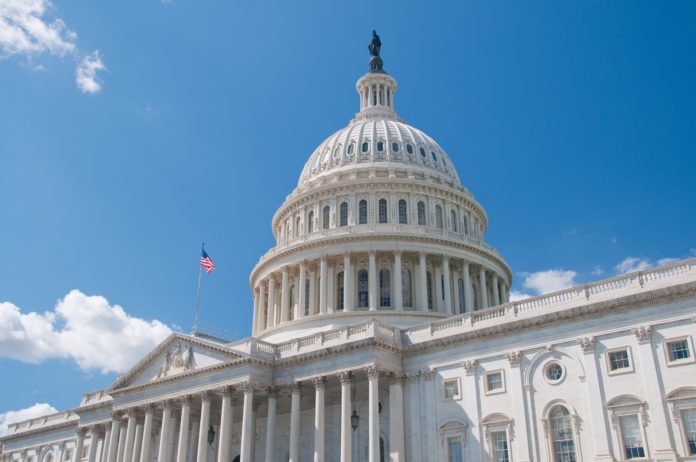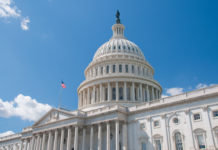Select each title below to read more:
Senate Finance Committee Releases Draft Reconciliation Bill: Health Issues
On June 16, the Senate Finance Committee (SFC) released draft text of its proposals for the Senate’s version of the One Big Beautiful Bill (OBBB). SFC has jurisdiction over tax as well as Medicare, Medicaid, and the Affordable Care Act. LeadingAge is still evaluating the new text as it compares to the House version of the bill. Some topline changes of note:
- Retroactive payments: In the House bill, retroactive eligibility for Medicaid was changed from 90 days to 30 days. In the SFC draft, they propose 30 days of retroactive coverage for the ACA population and 60 days for traditional Medicaid populations. LeadingAge had asked for 90 days particularly for those who are getting Medicaid due to age or disability. Ideally this would include those who are disabled getting coverage through the ACA expansion pathway. This change is a partial victory in that it gives more leeway for retroactive coverage for the populations that are mostly likely to need it; but we would prefer the changes go further.
- Provider Taxes: The House policy froze provider taxes where they are across all classes of taxes. The Senate bill goes further.
- The moratorium on new taxes remains for both expansion and non-expansion states. There is new language about when states can make changes relative to the date of enactment that we will analyze in the coming days.
- Starting in 2027, for expansion states, the hold harmless threshold decreases by 0.5% a year until 2031 when the hold harmless threshold would be 3.5%. Nursing homes and intermediate care facilities are excluded from this provision. However, LeadingAge knows that nursing homes receive money from provider taxes that are levied on classes besides nursing homes (such as hospitals and managed care organizations). The drop in the hold harmless threshold for other classes also means that expansion states will be receiving fewer federal dollars (in some cases, significantly fewer), which will have a negative impact on home- and community-based services as well as nursing homes.
- State directed payments: The House bill revised the payment limit for state directed payments (SDPs) to the Medicare rate for expansion states and 110% of Medicare for non-expansion states. The Senate version keeps this policy. It also adds a policy that existing SDPS would be reduced by 10% annually until the allowable Medicare-related payment rate is achieved. The House bill grandfathered in current SDPs without reductions.
- The work requirements were adjusted to: 1) cap the look-back for demonstrating community engagement at three months; the House bill would have allowed an indefinite lookback; 2) limits the exemption for parents to parents of children 14 and under. It also adds family caregivers to the definition based on the definition in the RAISE Family Caregiver’s Act; and 3) allows the Secretary to exempt states from the requirements until Dec 31, 2028, if a state is demonstrating a good faith effort to comply.
- The nursing home staffing standard elimination is in this bill but goes further than the House bill. It says that the rule can never be enforced as opposed to the House bill, which put a moratorium on enforcement until 2035.
Overall, the SFC bill takes an even harder swing at states that chose to expand Medicaid and uses what will likely be increased federal cuts to Medicaid, compared to the House bill, to fund priorities like tax increases for the wealthiest Americans. We will continue to analyze the bill but the SFC’s attempts to protect long-term care, we believe, do not do nearly enough to counterbalance the devastating impacts of such large cuts. We will provide a more detailed summary in the coming days along with action items. Read the SFC text here.
Comparison of Senate and House Tax Policy Proposals Impacting Nonprofits
While the Senate Finance Committee’s tax proposals are expected to shift somewhat as the bill moves forward, the Finance Committee’s initial text is more favorable than the House’s One Big Beautiful Bill Act in terms of its impact on nonprofits. This newly posted article provides a summary and compares the House and Senate positions on key issues. Follow federal policy developments impacting nonprofits through this serial post.
CMS Shortens Timeline for Public Release of Survey Findings
The Centers for Medicare & Medicaid Services (CMS) released memo QSO-25-19-ALL on June 17 announcing a policy change impacting all CMS-certified providers and suppliers that will now make survey findings available within 14 days of receipt by the provider, including immediately upon receipt by the provider. Previously, survey findings recorded on form CMS-2567 were held for up to 90 days after completion of a survey to allow time for the provider to complete and submit a Plan of Correction.
For many years, citations that were under dispute by the provider were withheld from public display even though the rest of the CMS-2567 was publicly available. A January 2023 memo changed this policy for nursing homes to allow CMS to publicly display citations under dispute with notation of the dispute and the opportunity for the nursing home to request a corrected copy of the CMS-2567 if the dispute resulted in any changes to the citation. It is unclear at this time if, under the new policy, an update will be made to the publicly displayed CMS-2567 to indicate that a provider has chosen to dispute a citation. LeadingAge is seeking clarification on this issue.
Invite Congress to Come to You!
Now is the time to schedule on-site visits with your members of Congress and put older adults’ and providers’ concerns front and center for lawmakers. Summer congressional recesses are a great opportunity to invite members of Congress to your aging services community. On-site visits give lawmakers a firsthand view of the care and services you provide, and an opportunity to hear directly from residents and patients, their families, and staff about the impact of elected officials’ decisions. H.R. 1 (a.k.a., One Big Beautiful Bill Act) negotiations in the Senate are moving quickly—so reach out to lawmakers’ offices today. Find the resources you need, including talking points and meeting tips, to help you get on their calendars now!
OSHA Holds Hearing on Proposed Standard for Employee Exposure to Heat
On June 16, the Occupational Safety and Health Administration (OSHA) held a hearing on its proposed rule relating to employee exposure to heat in the workplace. Issued in September 2024, the proposed rule would create detailed requirements employers must meet to protect employees from hazardous heat in both indoor and outdoor work settings. LeadingAge has been watching for indications of how the Trump Administration’s Department of Labor views the proposal.
While the hearing did not bring new, specific information about what lies ahead, that fact that OSHA proceeded with the hearing, which was scheduled while President Biden was in office, suggests that the agency has not decided to withdraw the rule altogether, at least not yet, as some observers thought might happen given the current Administration’s focus on deregulation.
Organizations presenting at the hearing included supporters of the proposed rule, including the AFL-CIO, the United Auto Workers, and the National Safety Council, as well as opponents like the U.S. Chamber of Commerce, which questioned OSHA’s legal authority to issue a final rule and voiced concerns about the proposal’s one-size-fits-all approach. Additional organizations will present to OSHA on subsequent days.
On January 14, 2025, LeadingAge submitted a letter with comments and concerns about the proposed rule, urging OSHA to acknowledge that not all work settings and activities are the same and identifying unique challenges home and community-based services providers would face, for example. We also commented on aspects of the proposed standard that are more prescriptive than necessary and called on OHSA to provide flexibility and scalability for employers. We will continue to watch for developments relating to the proposed heat standard and provide updates for members.
OIG Adds Evaluation of Medical Directors’ Engagement to Work Plan
In an updated work plan on June 16, the Health & Human Services (HHS) Office of Inspector General (OIG) announced that it will be evaluating the engagement of medical directors in nursing homes. “Monitoring Nursing Homes’ Engagement of Medical Directors” will examine 1) the extent to which medical directors performed required duties in nursing homes, 2) the extent to which payroll-based journal (PBJ) data on medical director hours are accurate and useful for oversight, and 3) opportunities to improve oversight and transparency of nursing homes’ engagement and funding of medical directors.
This comes at a time when medical directors are coming under higher scrutiny during the survey process as well. The report is expected to be issue in Fiscal Year 2026. Check out this and all active items on the OIG work plan here.
CMS Proposing Rule on State Directed Payments
On June 9, the Office of Management and Budget received a proposed rule from the Centers for Medicare and Medicaid Services (CMS) entitled “Medicaid Managed Care-State Directed Payments” (CMS-2449). We do not know what will be included in the rule, though we anticipate the rule will reverse some policies finalized in the prior administration. The current administration and congress have voiced opposition to codification of the limit of state directed payments (SDPs) at the average commercial rate, and restrictions on special payment terms. Use of the average commercial rate as a capped limit on SDPs has been customary policy, though codification at this cap in 2024 raised concerns among conservatives that the cap was too high. The current budget reconciliation bill (H.R. 1) would cap new SDPs at 110% of the Medicare rate, while allowing legacy agreements to continue. These changes would most commonly apply to payment agreements with hospitals and health systems and should not have significant implications for nursing homes or HCBS providers. Nursing home reimbursements in Medicaid fee-for-service are already capped at the Medicare rate. LeadingAge will monitor this proposed rule and provide more information as available.
LeadingAge Requests Deregulation Across Multiple Programs
On June 10, LeadingAge responded to a Centers for Medicare & Medicaid Services (CMS) Request for Information (RFI) on deregulation of the Medicare program and delivered a letter on streamlining suggestions to the Department of Housing and Urban Development (HUD).
Based on Executive Order 14192 “Unleashing Prosperity Through Deregulation,” CMS sought feedback on streamlining regulations to reduce administrative burden, identification of regulations or regulatory actions that were duplicative of others at either the federal or state level, and opportunities for reducing reporting and documentation administrative burdens. LeadingAge provided comments pertaining Home Health, Hospice, Medicare Advantage, Programs of All-Inclusive Care for the Elderly (PACE), and Nursing Homes. Additionally, LeadingAge took this opportunity to provide recommendations to HUD for streamlining HUD’s overall organization and tech systems, as well as the agency’s programs on production, preservation, asset management, portfolio oversight, and resident services. Read our comments to HUD here. See the full suite of LeadingAge’s June 10 comments in this bulletin.
Weekly Recaps: June 18, 2025
- Here is your Home Health Weekly Recap.
- Here is your Hospice Weekly Recap.
- Here is your Life Plan Community Recap.
- Here is your Medicaid, HCBS, and PACE Weekly Recap.
- Here is your Nursing Home Weekly Recap.
- Here is your Affordable Housing Weekly Recap.




